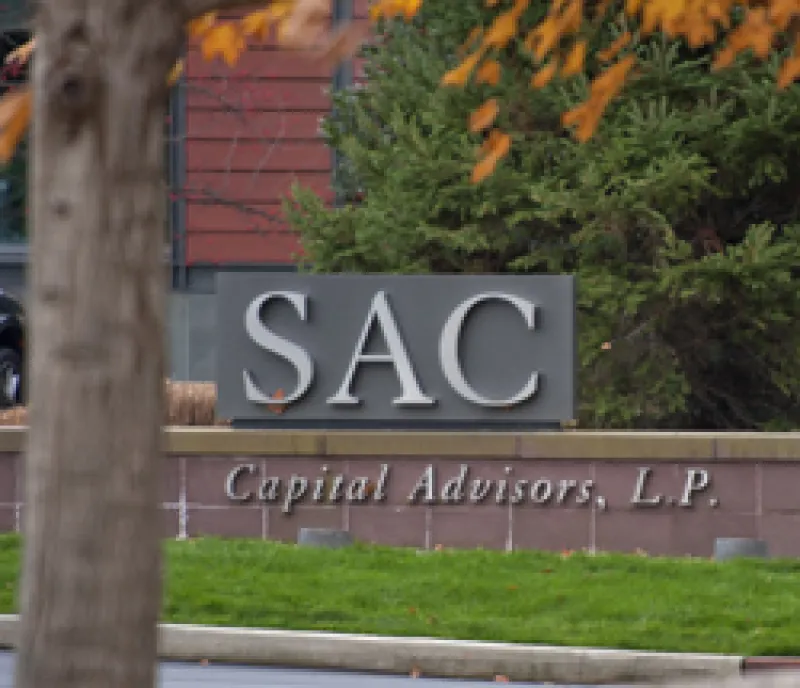All things considered, SAC Capital Advisors' Steve Cohen is having a pretty good year so far.
His flagship fund is up about 10 percent and this is after his 1 percent management fee and astounding 50 percent performance fee.
Assets under management continue to flow into the firm and were at $14 billion at the end of 2010, according to Institutional Investor's Hedge Fund 100 ranking.
However, 2011 is also proving to be something of a regulatory embarrassment for the multi-billionaire who grew up in Great Neck, New York, one of the most affluent communities on Long Island, the son of a dress manufacturer father and a piano teacher mother.
While neither Cohen, 55, nor his firm have been accused of any wrong-doing, at least seven former employees have fallen foul of federal regulators this year alone. Two of them pled guilty to criminal charges, in part for actions that took place while they worked at SAC, while the others settled civil claims made by the Securities and Exchange Commission.
Meanwhile, Senator Chuck Grassley of Iowa is investigating how the SEC handled referrals from the Financial Industry Regulatory Authority (FINRA) regarding suspicious trades by the Cohen's firm. In a press release, Grassley’s office says it is interested in whether the SEC is properly policing and regulating the financial markets on behalf of pension holders with investments in securities and other investors.
Let’s be clear. No one is accusing SAC founder Steve Cohen of any wrongdoing. And there is no evidence that Cohen was involved in any illegal activity.
Even so, one of the most over-riding questions is whether the targeted ex-SAC traders learned to skirt the rules from their experience at SAC, or whether they were generally the rules-breaking types who were kept in line by SAC’s compliance and oversight.
We don’t pretend to know the answer.
More than likely, they were motivated by a higher calling that has so permeated Wall Street that the average and above-average person who works there does not even realize it—greed.
Donald Longueuil and Noah Freeman Guilty Pleas
Earlier this year, former SAC portfolio managers Donald Longueuil and Noah Freeman pled guilty to insider trading charges stemming from their role in a wider government investigation into illegal insider trading among hedge funds and individuals who supplied them tips. The illegal activity took place partly during their tenure at SAC.
At the time, the US Attorney for the Southern District of New York charged Longueuil, who at one time also worked for Westport, Connecticut-based Empire Capital, and Freeman, who worked for Brookside Capital, the hedge fund affiliate of Bain Capital until 2004 before moving to SAC, which he left in early 2010, as well as Samir Barai of Barai Capital Management and Barai technology analyst Jason Pflaum.
The government said the four individuals participated in a conspiracy to obtain nonpublic information, including detailed financial earnings, about a number of public companies, including Marvell Technology Group, Nvidia, Fairchild Semiconductor, Advanced Micro Devices, Actel and Cypress Semiconductor.
According to the government, Barai and Longueuil each tried to destroy digital records and documents that would have shown they had received inside information from employees at public companies and that they in turn shared this information with each other and Freeman.
For example, at one time Freeman and Longueuil discussed a USB flash drive that Longueuil maintained and which contained critical incriminating evidence. According to the complaint, Longueuil told Freeman after reading about a newspaper report about the government’s widespread insider trading probe that he “pressed the eject button and everything’s [expletive] gone.”
Longueuil then detailed how he got rid of the USB drive, including how he pulled it apart with two pairs of pliars and put them into four little baggies. Then at 2 a.m. he put it into his North Face jacket, left the apartment, walked about 20 blocks, and threw them into four different random garbage trucks.
Longueuil pled guilty to one count of securities fraud based on his trading in Marvell, and one count of conspiracy to commit securities fraud and wire fraud. He faces up to 20 years in prison. He also agreed to forfeit more than $1.25 million in proceeds from the securities fraud offenses.
Freeman worked in SAC's Boston office from June 2008 through January 2010. Longueuil worked in SAC’s New York office from July 2008 through June 2010.
In a statement issued when the pair was initially charged earlier this year, SAC said it was “outraged” by the alleged actions, stressing it “required active circumvention of our compliance policies.” It pointed out at the time that the “egregious violations” of its ethical standards began at their prior firms in 2006 and continued after they joined SAC in mid-2008.
SAC also stressed the pair were employed by the firm “for a short time.” It said Freeman was fired in January 2010, and Longueuil in June 2010 due to poor performance.
Freeman pleaded guilty to one count of conspiracy to commit securities fraud and wire fraud and to securities fraud.
In court testimony, Freeman said he had run a standalone portfolio at SAC focused on technology stocks, primarily in the United States, although some in Asia as well. He told the court his strategy and trading approach was very company specific, and “ill suited” during the global financial crisis.
Freeman admitted to the court he circumvented SAC’s compliance policies, although he did say he told one of their portfolio managers about part of his scheme.
Longueuil is a former manager for a division of SAC, CR Instrinsic Investors, who worked from a New York office. He is a former professional speed skater who was best man at Freeman’s wedding.
Jonathan Hollander
On April 28, Jonathan Hollander settled charges with the SEC stemming from insider trading related to the impending acquisition of the supermarket chain Albertson’s (ABS). The complaint alleged that Hollander used material nonpublic information received from a friend who was employed by the financial advisor retained by ABS in connection with the acquisition to trade the stock. Hollander was also accused of tipping a family member and another friend who also traded ABS securities. As a result of their trading, Hollander and those with whom he shared the information generated $95,807 in illegal profits.
Without admitting or denying the SEC’s allegations, Hollander agreed to settle the charges against him and to disgorge $95,807 plus prejudgment interest and to pay a civil penalty of $95,807. Hollander was also barred from associating with a broker, dealer, investment adviser, municipal securities dealer or transfer agent for three years.
Hollander’s employer was not named by the SEC in its complaint. However, Bloomberg identified him as a former SAC analyst.
According to a published report, Hollander conducted his illegal trading in January 2006 at CR Intrinsic Investors, an SAC subsidiary.
Hollander founded Chesapeake Advisory Group after spending nearly four years with CR Intrinsic Investors, where he focused on natural resources, REITs, physical commodity and private equity investments. He also worked with Citicorp Venture Capital (CVC) as a private equity associate where he focused on leveraged buyouts and portfolio management in the technology and industrial sectors. Prior to CVC, Hollander was an analyst in the leveraged finance group at CSFB.
In January 2010, a press report identified Hollander as the unnamed recipient (in an SEC complaint) of an illegal tip regarding the impending takeover of Albertson’s. In response, SAC spokesman Jonathan Gasthalter said that SAC had looked into the allegations involving Hollander and the fund’s trading in Albertson’s stock in January 2009 after the SEC charged Ramesh Chakrapani of Blackstone Advisory Services in the Albertson’s insider trading case. “After reviewing the initial complaint in this matter, SAC thoroughly investigated this former employee’s trading in Albertsons and, on its own initiative, presented the findings to government authorities in February 2009,” said Gasthalter. “We have cooperated fully with the government’s investigation and will continue to do so.”
David Ganek, Anthony Chiasson, Forrest Fontana
In separate cases, Level Global, co-founded by David Ganek and Anthony Chiasson, and Forrest Fontana and Fontana Capital settled civil charges in connection with the breach of a Securities and Exchange Commission rule which prohibits the short selling of stock during a restricted period prior to a public offering and the subsequent repurchasing of the same securities in the offering.
Level Global agreed to pay more than $3.2 million in disgorgement, prejudgment interest and a civil penalty. It also agreed to cease and desist from committing or causing any violations and any future violations.
In February, Level Global announced plans to wind down its operations and fully liquidate its funds’ portfolios. It had been raided by Federal investigators last November as part of a widespread probe into insider trading.
Level Global was co-founded in 2003 by David Ganek and Anthony Chiasson, both of whom had previously worked for SAC. At year-end 2010, Level Global had $3.7 billion of assets under management in its Level Global Overseas Master Fund and Level Radar Master Fund.
The SEC said Level Global violated Rule 105 in April 2009 when it sold short in advance of participating in a public offering by Goldman Sachs, resulting in profits of $298,415. Then in May 2009 it committed a similar infraction when participating in a public offering by Regions Financial, resulting in profits of nearly $2.4 million. Altogether, Level Global made nearly $2.7 million. The firm had about $4 billion when it closed down earlier this year.
The SEC said Level Global did not have policies, procedures or controls in place designed to detect or prevent Rule 105 violations.
Ganek worked at SAC from 1997 through 2003. He is known for his large art collection. His father, Howard Ganek, was a former partner at Neuberger & Berman and was a New York socialite. After graduating from Franklin and Marshall College, David Ganek worked in the risk arbitrage department at Donaldson, Lufkin & Jenrette before joining SAC.
Chiasson, a Babson College graduate, was a tech analyst at SAC, where he worked with Ganek. He served as head of research at Level Global. Before joining SAC, Chiasson was an analyst at Salomon Brothers and Credit Suisse First Boston.
Forrest Fontana and Fontana Capital also agreed to settle charges by the SEC that they violated Rule 105 on three occasions from July 2008 through November 2008. According to the regulator, they participated in public offerings by XL Group PLC, Merrill Lynch and Wells Fargo after having shorted each of these securities during the five business days prior to the pricing of the offerings. Fontana made $816,184 from the offerings.
Fontana created Boston-based Fontana Capital in 2005 with $50 million in seed capital from Cohen. Fontana served as chief investment officer and portfolio manager of the firm, which specialized in financial stocks. The firm eventually managed more than $300 million. However, after Fontana struggled in the early days of the financial crisis, Cohen withdrew his money in 2007. In 2009, Fontana had just $16 million and he shut his firm the following year.
Fontana graduated from Vanderbilt University’s school of engineering in 1987 and received his MBA from Columbia University in New York in 1993. He also previously worked for Fidelity Investments and Putnam Investments.
Under the settlement, Fontana and the firm agreed to pay $985,000 in disgorgement, prejudgment interest and a civil penalty.
Fontana, as it turns out, is no stranger to regulators. A number of years ago he was accused of frequently speaking with a Morgan Keegan analyst who was about to issue a scathing report on Canadian insurer Fairfax Financial Holdings, which resulted in the company’s stock falling sharply. According to published reports, Fairfax accused SAC and a number of high profile hedge funds of conspiring to drive down its stock price.
This case is still pending.
Robert Feinblatt
On January 10, the SEC filed a civil injunctive action against Robert Feinblatt, a co-founder and principal of New York-based hedge fund investment adviser Trivium Capital Management, and Trivium analyst Jeffrey Yokuty, alleging they engaged in insider trading in the securities of Polycom, Hilton, Google and Kronos. Trivium was also charged with insider trading.
The SEC also alleged that Polycom senior executive Sunil Bhalla and Shammara Hussain, an employee at investor relations consulting firm Market Street Partners, which did work for Google, tipped the inside information that enabled Feinblatt and Yokuty to trade on inside information on behalf of Trivium’s hedge funds.
The actions were part of the SEC’s Galleon insider trading case.
Feinblatt spent on year as an analyst at SAC before leaving in 2002 to found Trivium, which at its height had $980 million under management. It closed its doors in December 2008 after suffering large losses that year.
The SEC alleged that Trivium’s hedge funds made more than $15 million from these illegal trades.
In June a judgment was entered against Hussain. The Judge also dismissed the case against Trivium in exchange for its agreement to cooperate and cease doing business.
In late June the SEC amended its complaint against Feinblatt. On July 18, the regulator said Feinblatt consented to a final judgment, which, among other things, requires him to pay about $2.7 million, including disgorgement of about $830 million representing profits gained and losses avoided as a result of his conduct, prejudgment interest of $186,023, and a civil penalty of more than $1.6 million.







